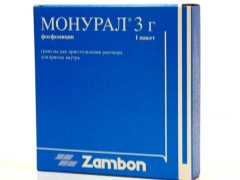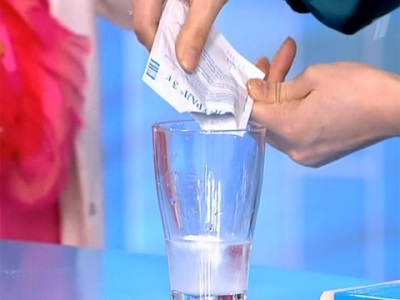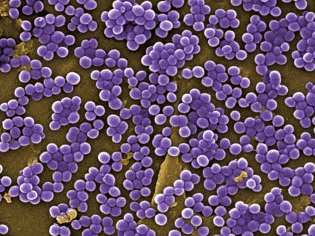Monural for children
The treatment of cystitis often requires the prescription of antibacterial drugs, among which Monural is very popular. Its main advantage is short-term use, so the harmful effects on the body is limited. But can monural be used to treat children?
Composition
The active active ingredient in the composition of Monural - fosfomycin. Auxiliary components of the drug are mandarin and orange flavors, saccharin and sucrose.
Release form
Monural is produced in the form of white granules, which easily dissolve in water. They are packed in bags of 2 grams. Sachets are also available with 3 grams of such soluble granules inside. One Monural carton can contain 1 or 2 bags of granules.
Operating principle
Monural is referred to as antibacterial drugs, which have a fairly wide range of effects. Its active substance is rapidly absorbed in the digestive system and soon enters the urine. Concentration increases in just a few hours, as a result of which the drug actively influences microorganisms in the urinary tract.
Since the medicine is effective both for the destruction gram-positive bacteria (staphylococci, enterococci and others), so for the impact on gram-negative flora (E. coli, citrobacter, Proteus, Klebsiella, etc.), Monural quickly relieves the patient from infection. The effect of a single dose of such an antiseptic lasts for two days. Next, the drug leaves the body with urine (90%) and intestinal contents (10%).
Indications
The scope of use of Monural - inflammatory diseases of the urinary system of an infectious nature. The drug is prescribed to children in such cases:
- With cystitis. The drug is especially effective for the bright symptoms of this inflammation, but it also helps in chronic conditions.
- When urethritis.
- When inflammation of the urinary tract in the postoperative period.
- When bacteria are detected in the urine.
- With pyelonephritis, as one of the complex treatment of such diseases.
Monural can also be prescribed for prophylactic purposes if the child undergoes urinary tract surgery or a diagnostic procedure.
Look at the release of the program "Consilium", in which guests - practicing doctors of various specialties, give detailed information about infectious diseases of the urinary tract in children:
At what age is it allowed to take?
Instructions for use of Monural includes information that the tool should not be used for children under 5 years of age. This is a very strong antibiotic, so at the age of 4 years, 3 years or younger, the tool can adversely affect children's health. In such children, the digestive system and kidneys are not fully mature, so taking Monuralla can have a bad effect on their condition.
But even at the age when treatment with this drug is permissible, for example, at 6 years or 10 years, you should not give Monural to a child without a doctor's prescription. Self-medication and overdosing can harm and not help get rid of the disease.
Contraindications
In addition to the age of 5 years, Monural children do not give:
- With allergies on any of its components.
- In chronic renal disease, due to which severe insufficiency developed.
Because the medicine contains sucrose, the presence of diabetes in a child requires additional attention when applying Monural. In the first stages of renal failure, the dosage of the medicine is adjusted by the doctor. A nursing mother should not take Monural, as when feeding such a drug penetrates the milk.
Side effects
A baby’s body can react to Monural with vomiting, diarrhea, or nausea. With such adverse symptoms should increase the amount of drink consumed by the child per day. Also, in some children, taking this medication can trigger an allergic rash.
Instructions for use and dosage
Dissolving the granules from one sachet into a third glass of water, the liquid is given to the child to drink after eating two hours or two hours before meals (food in the stomach will slow down the absorption of the active substance). For a good therapeutic effect Monural advised to give overnight. In addition, it is important to empty the bladder before taking the medicine.
Monural treatment is often a single dose. Dosage for children age - 2 grams of Monural. As a rule, reapplication is not required. If the course of the disease is complex, and the therapeutic effect after a single dose is not observed, a day later the medicine is given to the child in the same dose again.
A double intake is also required for preventive treatment with Monural. The child is given the first dose of medication before the diagnostic procedure or urological surgery (3 hours), and the second after the intervention, after waiting 24 hours between doses.
Some more useful information about Monural can be found in the video:
Overdose
If the dosage on the weight of the child is unnecessary, this will trigger digestive upset, excessive sweating and a rise in body temperature. In this situation, the child should be given more to drink, so that the drug quickly leaves the body with urine.
Interaction with other drugs
You can not simultaneously give the child Monural and drugs containing metoclopramide, as this compound will lower the concentration of the active substance of Monural in the blood and urine, making the treatment ineffective.
Terms of sale
Monural can be purchased at the pharmacy after a prescription from the doctor.
Storage conditions and shelf life
To store Monural you need to find a place with a temperature of no more than + 30 ° C, where a small child cannot reach. The shelf life of the drug since release is 3 years.
Reviews
Almost all the reviews about taking the drug are positive, and negative evaluations are rare. Mothers call this medicine very effective and are pleased that in most cases it is required to give it to the child only once.
In addition, children rarely protest against taking Monural, because after dilution of the granules, a delicious sweet liquid is obtained. Side effects from such treatment are quite rare, and the cost of the funds is considered acceptable by most parents (one sachet can be purchased for 300-350 rubles).
Analogs
Monural can be replaced by drugs in which the same active ingredient, for example, Fosfomycin, Monuril or Urofosfabol. Also in the treatment of cystitis instead of Monural, you can use drugs with a similar effect, among which the most popular Furadonin, Urolesan and Amoxicillin.


















